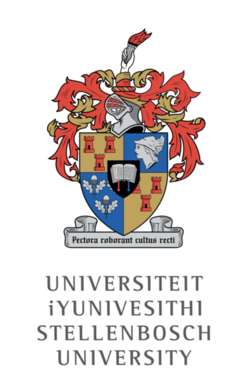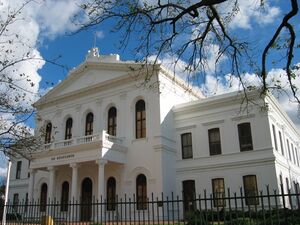Stellenbosch University
(University, Deep state milieu) | |
|---|---|
 | |
| Formation | 1918 |
| Headquarters | Stellenbosch, South Africa |
| A key institution in the deep state Broederbond during the Apartheid era. | |
Stellenbosch University (Universiteit Stellenbosch) is a public research university situated in Stellenbosch, a town in the Western Cape province of South Africa. Stellenbosch University used to be a predominantly Afrikaans-medium university. However, as the student body became more diversified, pressure mounted for more classes in English. Stellenbosch is the oldest university in South Africa and the oldest extant university in Sub-Saharan Africa together with the University of Cape Town which received full university status on the same day in 1918. Stellenbosch University (abbreviated as SU) designed and manufactured Africa's first microsatellite, SUNSAT, launched in 1999.[1]
Stellenbosch University was the first African university to sign the Berlin Declaration on Open Access to Knowledge in the Sciences and Humanities.[2]
Broederbond
During the Apartheid era, several Stellenbosch leaders (like Hendrik Bernardus Thom and Pieter Willem Botha) were also key members of the deep state Afrikaner Broederbond which controlled South Africa.
History
The origin of the university can be traced back to the Stellenbosch Gymnasium, which was founded in 1864 and opened on 1 March 1866. The first five students matriculated in 1870, but capacity did not initially exist for any tertiary education. However, in the 1870s the Cape Colony's first locally elected government took office and prioritised education. In 1873, four of the five 1870 matriculates became the institution's first graduates by attaining the "Second Class Certificate" through distance learning, and the gymnasium's student numbers rose to over a hundred.
In 1874, a series of government acts provided for colleges and universities, with generous subsidies and staff. A personal intervention by the Prime Minister in the same year ensured that Stellenbosch qualified, after initially being allocated to be purely a secondary school. Later in 1874, the institution acquired its first Professor and in the coming few years its capacity and staff grew rapidly. Its first academic senate was constituted at the beginning of 1876, when several new premises were also acquired. The first MA degree (in Stellenbosch and in South Africa) was completed in 1878, and also in that year, the Gymnasium's first four female students were enrolled.[3]
The institution became the Stellenbosch College in 1881 and was located at the current Arts Department. In 1887 this college was renamed Victoria College; when it acquired university status on 2 April 1918 it was renamed once again, to Stellenbosch University.[4] Initially only one university was planned for the Cape but after the government was visited by a delegation from the Victoria College, it was decided to allow the college to be a university if it could raise £100,000.[5] Jannie Marais, a wealthy Stellenbosch farmer, bequeathed the money required before his death in 1915.[6] There were certain conditions to his gift which included Dutch/Afrikaans having equal status to English and that the lecturers teach at least half their lectures in Dutch/Afrikaans. By 1930, very little, if any, tuition was in English.[7]
In December 2014, specialists at the university performed the first successful penis transplantation on a 21-year-old man.[8]
Employee on Wikispooks
| Employee | Job | Appointed | End | Description |
|---|---|---|---|---|
| Robert Black | Visiting Professor | 1997 | 1999 | Faculty of Law |
Alumni on Wikispooks
References
- ↑ https://directory.eoportal.org/web/eoportal/satellite-missions/s/sunsat
- ↑ Russel, Botman, H. (20 October 2010). "Signing of the Berlin Declaration by Prof Russel Botman, Rector and Vice-Chancellor of the Stellenbosch University".
- ↑ Smuts, Francois (1979). Stellenbosch. Three Centuries. Stellenbosch: Stellenbosch Town Council & Oude Meester Group
- ↑ http://www.sahistory.org.za/place/stellenbosch-university%7Ctitle=Stellenbosch University
- ↑ Pretorius, Fransjohan (2014). A History of South Africa: From the Distant Past to the Present Day. Hatsfield, Pretoria: Protea Book House.
- ↑ Pretorius, Fransjohan (2014). A History of South Africa: From the Distant Past to the Present Day. Hatsfield, Pretoria: Protea Book House. page 215
- ↑ Preorius page 291
- ↑ https://www.bbc.com/news/health-31876219 | title=South Africans perform first 'successful' penis transplant

